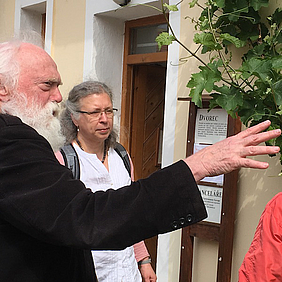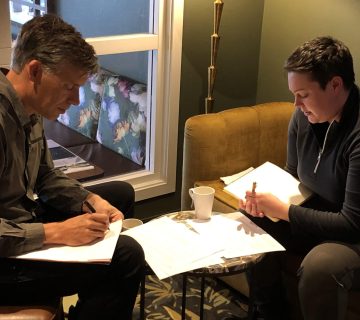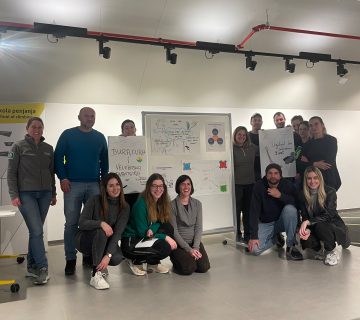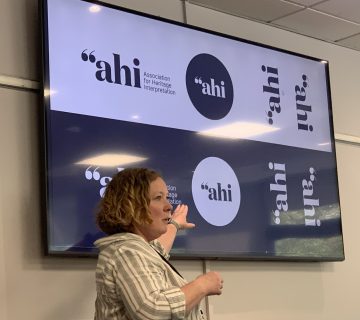A personal review of the certified interpretive training taster workshops held at the Spring Event in Prague.
Prague’s Spring Event was the second IE conference that I have attended and, since I did not have the worry of presenting a project this time, I was able to enjoy the work of others and really engage in the workshops.
I focused on the IE certified interpretive training course taster workshops as I felt they had the most hands-on relevance for my job, and I will share some of my views and the amazing experience that I had.
The first workshop explored the new Certified Live Interpreter (CLI) course being developed on behalf of IE by Past Pleasures Ltd. A pilot course will run in September. The workshop was led by the inimitable and flamboyant Mark Wallis. The first shock was that Past Pleasures staff do not use scripts and would recommend that this is a policy followed for all good live interpretation. Being free of scripts allows the interpreter to respond to the visitor’s interest while still adhering to the aims and structure of the event. Mark explained about the ‘metaphysical hats’ that the interpreter should be able to wear depending on the circumstances:
- The host – welcoming the visitor
- The entertainer – using humour and theatricality
- The expert – knowing more than the visitor (even if that is just where the toilets are)
- The guardian – looking after the site and the visitors
The good live interpreter should be able to switch hats at the drop of a hat! And, in order to decide which hat to wear, has to be able to read body language quickly and accurately to decide which one of several hundred archetypes the visitor is. We had great fun imitating some of the stances and facial postures of these archetypes and deciding how best to deal with a range of visitors. The ability to recognise an offer to engage from a visitor was also demonstrated. Even more importantly, we learned how to extract ourselves gracefully from a too enthusiastic visitor
After teaching us to bow and curtsey – and a little about general period posture – Mark summed up the skills of a good live interpreter in his E-numbers list:
Emotion
Engagement
Energy
Erudition
Expertise
Empathy
End
The second workshop I attended was the original Certified Interpretive Guide (CIG) course taster. This training course has so far trained 76 certified guides and is now spreading the word through its Certified Interpretive Guide Trainers (CIGT) ‘training the trainers’ course. In fact, our workshop was led by both Sandy Colvine and by Franziska Peter who was doing the last part of her practical test to become a new trainer.
Sandy started by quoting Freeman Tilden, the father of interpretation, who said:
‘ You only have to attend some of the worst performances in interpretation to wish heartily that there were some teachable principle and schools of interpretation’ (sic)
Certainly, after attending this workshop, I think that IE is filling that gap and providing that training.
We created a mini guided tour, summing up a succinct emotional response to an object of our choice in the outside courtyard, in one sentence. We worked with a partner and then shared our sentences with the group on a short stroll around the honey factories, the gates to the unknown and other wonderful things hiding in plain sight in a simple cobbled square. A simple technique for building the skeleton of any guided walk.
We were then asked to break into groups and analyse the personality of three ostensibly identical grapevines. Did you know that a grapevine can be a hippy or a young tiger, lazy or ambitious? Well neither did the teams, but sure enough if you look beyond the obvious you can create a magic moment on your guided walk.
The next full course being offered by IE will be in English in Brno in the Czech Republic from 25th to 30th August and, following that, another two will be offered in Switzerland. Keep an eye on the training page of the IE website.
The third taster workshop offered at the conference was with Steven Richards-Price, looking at some of the themes that will be studied in the new Certified Interpretive Writer (CIW) course. First of all, Steven got our creative juices running by allowing us to do free writing with a vital tool: a pencil. Pencils, maintain Steven, are good for creativity, and free writing allowed us to ‘Fill our paper with the beatings of our heart’, as Wordsworth said. The technique is a good way of exploring what interests you about the subject, it can help you use language fluently and spontaneously and can yield phrases for future use.
We were then asked to identify our favourite piece of interpretation from a selection. Surprisingly, it was a piece about hand-driers that won, showing that even mundane items can be interpreted in an interesting way!
The first CIW course will be a pilot in September in Elefsina in Greece, so if you fancy a bit of late summer sun and learning a fabulous suite of new skills, sign up for this great experience.
Finally, I attended a workshop looking at developing a course for the Certified Interpretive Planner (CIP). This half hour session was far too short for us to explore all the questions and ideas for the course methods and structure, but we did our best in a cafe style workshop: sharing ideas about what skills a planner should have, what tools they should use and course methods IE’s course should use to develop these.
There are three audiences for this training:
- Professional interpretive planners who want tools to improve their own work
- Site managers with a responsibility for interpretation, who want to be able to discern quality in other’s plans and who want to put plans into practice; and
- Interpreters who want to develop into the planning field and need to learn IP approaches.
The Interpretive Planning course is still being worked up but will enable participants to get familiar with IP tools, understand IP as a process, test some tools at a model site and meet different approaches to IP and use real life examples. The date and location will be publicised as soon as they are agreed.
In summary, Interpret Europe’s range of professional certified training is setting the bar high. Its cooperative peer-to-peer approach is a fabulous example of a ground-up, grassroots programme. The courses teach inspiration by being inspirational and passionate. I believe that this training will open up professional opportunities for many.
See the training section for dates of upcoming courses in your area and language and keep up to date with the training page of the website: https://www.interpret-europe.net/top/training.html
Abby McSherry lives in Ireland and is project officer of a landscape partnership scheme in Northern Ireland: www.ringofgullion.org. She also volunteers in the IE News Team. Abby can be contacted at: abby.mcsherry@nmandd.org
To cite this article:
McSherry, Abby (2017) ‘Certified heritage interpretation sets bar high in Prague ‘. In Interpret Europe Newsletter 2-2017, 8 -10.
Available online:
www.interpret-europe.net/fileadmin/Documents/publications/Newsletters/ie-newsletter_2017-2_summer.pdf




